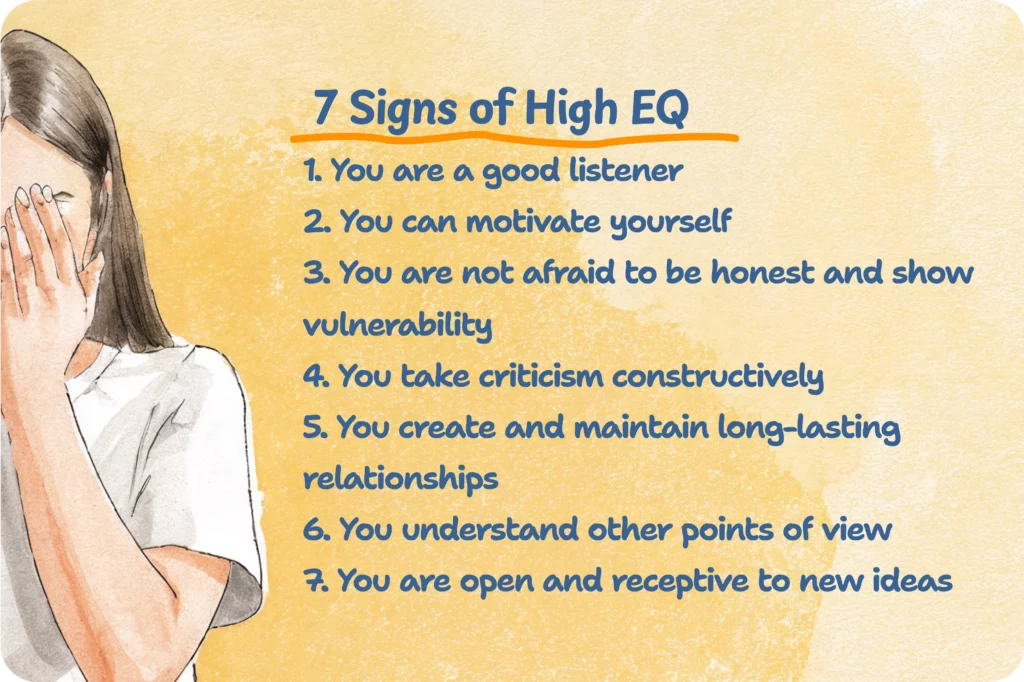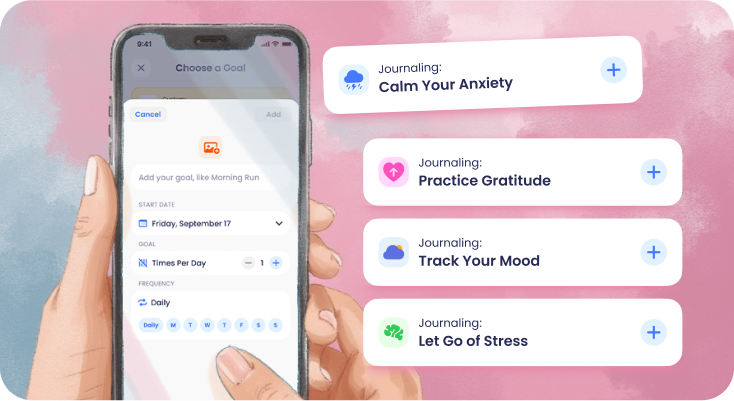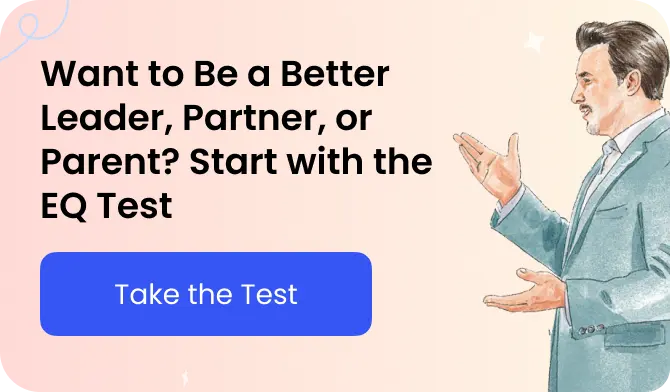The average person has more than 400 emotional experiences every day, according to Dr. Travis Bradberry, co-author of the bestseller Emotional Intelligence 2.0. That’s why he emphasizes that emotional intelligence is a crucial skill for managing those emotions effectively. EQ helps us communicate clearly, build strong relationships, adapt to change, and cope with stress—ultimately shaping our health, family life, and career success.
But what does it actually mean to have a high emotional quotient? And do you have a high level of self-awareness? Find out by taking the Emotional Intelligence test.
What Is Emotional Intelligence?
Emotional intelligence is the ability to recognize, understand, and manage your own emotions—while also responding effectively to the emotions of others. It includes key skills like self-awareness, self-regulation, motivation, empathy, and social skills.
These components work together to help a person make decisions, solve problems, and communicate with others effectively. In fact, it is also about being aware of how to feel your feelings and how they affect your decisions and relationships.
Researchers Mayer and Salovey were the first to define emotional intelligence in the 1990s [1]. Then, Daniel Goleman popularized the concept through his bestselling book Emotional Intelligence: Why It Can Matter More Than IQ, bringing the concept into mainstream attention, especially in business and leadership contexts.
Curious about your emotional quotient and leadership traits? Breeze offers a variety of self-discovery tests to help you understand yourself better. From exploring your attachment style or temperament to uncovering your mental age or how likable you are, Breeze tests provide personalized insights and actionable tips to help you improve self-awareness and change your life for the better.

The Five Key Components of Emotional Intelligence
According to Daniel Goleman, psychologist, author, and science journalist, emotional intelligence consists of five elements:
1. Self-awareness
Self-awareness helps you recognize your feelings, identify your core values, and reflect on how emotions shape your decisions and actions.
2. Self-regulation
Self-regulation means managing impulses and maintaining control under stress. It also supports healthy habits, follow-through on commitments, and the ability to pause before reacting in anger or frustration.
3. Motivation
Motivation drives learning, goal-setting, and persistence—even after setbacks.
4. Empathy
Empathy is the ability to understand and connect with other people’s feelings. It involves listening deeply, tuning into nonverbal signals, and being emotionally present in relationships.
5. Social skills
This means being able to communicate effectively:
- clearly communicating your thoughts and needs;
- expressing and reasonably defending your opinion;
- respecting the other person and understanding that they may have different views and have the right to defend them;
- controlling your emotions and choosing a way of communication;
- recognizing and understanding non-verbal signals.
Find out how to make your life more fulfilling with a quick, free test.
Is High EQ rare?
Yes, high emotional intelligence is relatively rare. Travis Bradberry’s research suggests that only about 36% of people globally are truly emotionally intelligent. This rarity is supported by TalentSmartEQ statistics, such as the average EQ score on a 100-point scale being 75 [2].
At the same time, given the skills shifts happening worldwide, McKinsey’s Automation and the Future of the Workforce study predicts that demand for emotional skills will increase by 26% by 2030 [3]. Typically, people with high emotional intelligence usually develop it by practicing self-awareness, empathy, and social skills.
How Emotional Intelligence Can Impact Your Life: 4 Benefits
Emotional intelligence helps you grow in the following areas:
1. Better Relationships
When you can understand and respect how someone else feels, it’s easier to build trust and resolve conflicts. When you are self-aware, you may take a moment to listen, see things from their side, and respond calmly. Instead of creating distance, you strengthen the relationship and come out of the conversation closer than before.
2. Managing Emotions at Work
As for emotional intelligence in the workplace, the research conducted by TalentSmart, a consulting company co-founded by Dr. Travis Bradberry, revealed that emotional intelligence can predict performance. In fact, it’s behind 58% of successful performers across all kinds of jobs [4]. The reason is that having good emotional skills helps you in lots of important ways, like decision-making, teamwork, presentation skills, time management, customer service, stress tolerance, assertiveness, and more.
3. Resilience
When you understand your emotions and know how to regulate your nervous system, you’re less likely to feel overwhelmed, anxious, or stuck, thinking, “I don’t know what to do with my life.” Emotional intelligence matters because it helps you manage your emotions and maintain a healthier perspective on problems, which can reduce stress.
4. Effective Leadership
Leaders with strong emotional competencies tend to show genuine care for their employees and prioritize their emotional well-being. An empathetic and self-aware manager can better understand when and why an employee feels unmotivated.
As a result, employees feel more satisfied with their jobs, get motivated, and perform better in the workplace. According to 2025 data from Electro IQ, 87% of millennials say they’re more motivated when their bosses demonstrate strong emotional skills, which directly boosts company success. And 52% of companies now prioritize emotional intelligence when choosing senior managers [5].
What Happens If You Lack Emotional Intelligence Skills?
Low emotional intelligence isn’t just about being “bad with feelings”. It can affect your career growth, relationships, and overall well-being:
- Without the ability to recognize and manage your own emotions and those of other people, you might react impulsively or misread situations. As a consequence, you may sometimes feel like a failure, wondering, “Why does nobody like me?”
- When you lack emotional intelligence, you may feel difficulties in collaborating, communicating effectively, or handling criticism without taking things personally. Besides, a person who lacks social awareness may wonder, “Why am I so unmotivated?”, which can hurt productivity
- Moreover, you may feel empty thinking that other people’s lives are much more interesting than your own. In this case, you also need to increase your self-confidence and work on self-awareness.
- Without emotional intelligence, you might get defensive and make the situation of conflıcts worse. As a result, you may later wonder, “Why do I push people away?”
Expert Insight
Emotional intelligence isn’t fixed. It’s partly influenced by temperament but largely built through practice. Research and clinical experience show that anyone can strengthen EQ skills over time. Through therapy and daily practice, people can build self-awareness, strengthen emotional regulation, and improve empathy. For example, mindfulness helps regulate emotions, cognitive-behavioral strategies reframe unhelpful thoughts, and role-playing enhances communication.
Megan Smith
Mental health professional
Key Skills of Emotionally Intelligent People
Here are some key traits that emotionally intelligent people often share:
- The habit of relying on oneself and living without emotional dependency on others.
- Self-acceptance. Understanding and accepting yourself, working on your strengths and weaknesses, and learning how to love yourself.
- Assertiveness and self-expression. As emotional intelligence allows you to manage anger issues or calm down under pressure, you can clearly express your thoughts and needs, and demonstrate willpower, persistence, and determination when necessary.
- The ability to empathize. An empathetic person can “read” non-verbal signs, respects other people’s feelings, interests, and weaknesses, and feels justice.
- The ability to build healthy relationships. People with developed EI are capable of making friends as an adult and be a better friend and partner. They can identify gaslighting or other manipulations and are less likely to be influenced by other people’s moods.
Do you believe that you have high emotional intelligence?
7 Signs of High EQ
Here are 7 signs that you have high emotional intelligence:
1. You listen deeply and can recognize both emotions and intentions in others.
2. You self-motivate and stay on track with goals even when circumstances are challenging.
3. You are not afraid to be honest with people and show vulnerability.
4. You take criticism constructively, seeing it not as a threat, but as an opportunity to grow.
5. You build and sustain lasting, healthy relationships.
6. You understand other points of view and can put yourself in others’ shoes.
7. You welcome new ideas, which supports personal and professional growth.

Examples of Emotional Intelligence in Action
Here are examples of the behavior of emotionally intelligent people in different areas of life:
At work
People with high emotional intelligence adapt to changes faster. They are not afraid of conflicts and can resolve them constructively. Their colleagues feel relaxed when working with them because they create an atmosphere of trust and support.
For example, during a team project, when deadlines were suddenly moved up, they can calmly reorganize tasks, listen to everyone’s concerns, and help the team stay focused without frustration.
In relationships
Emotional intelligence helps to consider the partner’s feelings and sensitively react to them. People with high emotional intelligence can use their empathy and social skills to find compromise solutions and build cooperation. For example, when a partner expresses frustration about household chores, they respond with understanding, asking how they can help rather than becoming defensive.
In parenting
Instead of getting irritated, panicking, or losing control, emotional intelligence helps stay calm, focus on solving the problem, and make thoughtful decisions. For instance, if a child is upset about homework, the emotionally intelligent parent listens, understands their feelings, and calmly helps them figure out a solution. This way, parents also teach a child to find inner motivation and overcome challenges to succeed.
Measuring Emotional Intelligence
Four standard tools are used to measure emotional intelligence [6]:
1. Multi-Health Systems EQ-i 2.0
The EQ-i 2.0 uses 133 statements and produces a comprehensive report, widely used for workplace assessments.
2. Mayer-Salovey-Caruso’s MSCEIT
The MSCEIT measures four EI areas—perception, use, understanding, and management—through 141 items, producing 15 different scores.
3. Goleman and Hay Group’s ESCI
The ESCI assesses 12 competencies across self-awareness, self-management, social awareness, and relationship management.
The Emotional and Social Competency Inventory (ESCI) focuses on both social awareness and emotional intelligence. It assesses 12 competencies, four of which are in the following areas: self-awareness, self-management, social awareness, and relationship management.
4. Six Seconds SEI
The SEI is action-oriented, offering both assessment and strategies for building EQ. It’s available in 24 languages for adults and children.
While these tools offer in-depth assessment and emotional intelligence training, you might prefer something easier to get started. If you want to learn how to talk to anyone or how to get out of your head when you’re stressed or anxious, take a free Emotional Intelligence test.
How to Improve Emotional Intelligence
Here are 5 practical ways to strengthen each component of emotional intelligence, and to become the best version of yourself in almost every area of life:
1. Stop-Signal Technique
A self-regulation tool for pausing before reacting—useful when you feel emotional or impulsive. It consists of several steps:
- Stop. Pause, breathe, and ground yourself—step away if needed.
- Evaluate the situation and your emotional perception. Ask yourself: “What exactly am I feeling and why? What happens if I act impulsively?”
- Think about ways to respond with better self-awareness. Decide in what way you want the situation to be resolved.
- Choose an action based on your situation assessment and the possible alternatives. This could be something you decide to do now or an action plan you will implement later.
- Reflect. Reflect afterward on whether your response worked and what you learned. This step helps to develop a more positive outlook and conflict management skill, and avoid mistakes in the future.
2. Journaling
Write down your feelings, triggers, and reactions daily. Look for patterns, reflect on how emotions influence your actions, and use this insight to change unhelpful responses.
Unlike traditional journaling, which can feel time-consuming or formal, Breeze journaling focuses on quick, honest reflections about your thoughts, emotional skills and daily experiences. Breeze journaling with self-reflection prompts helps you better understand your own feelings and needs, improve self-management, and social awareness.

3. Visualizing Goals
Visualization builds motivation and confidence by mentally rehearsing success. Research on the effectiveness of imagery confirms that visualizing goals can be an effective strategy for achievement [7]. The reason is that it activates neural pathways similar to actual experiences and thus increases motivation, boosts confidence, and improves performance.
- Setting goals. Identify short- and long-term goals.
- Starting the visualization. Close your eyes and imagine achieving them. Focus on emotions, people, and details.
- Detailing. Add details to your visualization. What does your success look like? How do you feel? What sounds, smells, or tastes are present?
- Analyzing sensations. After you have clearly imagined the achieved goal, focus on your sensations and emotions. How do you feel when you have achieved this success? Anchor the positive feelings to boost persistence in real life.
The Breeze app can help you set up a goal and track your progress. You can note small achievements and reflect on how each step brings you closer to your larger goals.

4. Active Listening
Active listening strengthens empathy and relationships by ensuring people feel truly heard.
- Give them your full attention. When someone is speaking, remove any distractions, such as your phone, close your laptop, and resist the urge to multitask.
- Maintain eye contact with the person you are speaking to. This will not only show that you are paying attention, but will also help you better understand their emotions.
- Use supportive gestures and facial expressions, such as nodding your head or smiling, to show that you are engaged in the conversation.
- Don’t interrupt. Allow the other person to finish their thought before you speak and take a moment to process what they’ve said.
- Delaying your own opinion. Try not to form your own opinion or response until the other person has finished speaking. This will help you understand them better and not interrupt their train of thought.
- After the conversation, give them feedback. Depending on the context, you can acknowledge the effort, encourage them, or offer help.
This exercise may take some practice, especially if you are used to more passive or distant forms of communication. Active listening is not just a set of techniques, but also a way of communicating that requires a genuine interest in the other person. Practicing active listening can improve your empathic ability and, therefore, the quality of your relationships with others. This is a simple yet powerful exercise that anyone can master.

5. “I-statements” Exercise
The goal of this exercise is to become emotionally intelligent through constructive expression of your feelings and needs. “I-statements” help to avoid blaming and criticizing, and manage stress, focusing on your personal feelings and perception of the situation.
- First, identify what exactly you feel or what need you want to express. It could be something like “I feel ignored” or “I need more time to myself.”
- Formulate your “I-statement” by starting the phrase with “I feel…” or “I need…” and then explain what caused this feeling or need. For example: “I feel ignored when you don’t respond to my messages.”
- Think about the appropriate time and place to speak up. Not all situations are equally well-suited for frank conversations.
- Share your “I-statements” with the other person, trying to remain calm and open to dialogue.
- Listen actively. After you have expressed your feelings or needs, give the other person a chance to respond using active listening skills.
- After sharing your opinions, discuss how the situation can be improved or if the needs of both parties can be met.
Expert Insight
While some people may naturally be more attuned to emotions, research and clinical experience show that EQ is a skill set that grows with intentional effort. The brain’s neuroplasticity allows these skills to be learned and reinforced at any stage of life. I often see clients make noticeable progress when they consistently practice reflection, empathy, and healthy communication. In short, emotional intelligence can absolutely be cultivated. With practice and support, anyone can become more emotionally intelligent.
Megan Smith
Mental health professional
Sources
1. Peter Salovey, John D. Mayer. Emotional Intelligence.
2. Jean Greaves. How Do You Stack Up? EQ Trends by Industry. June 2022.
3. Jacques Bughin, Eric Hazan, Susan Lund, Peter Dahlström, Anna Wiesinger, and Amresh Subramaniam. Skill shift: Automation and the future of the workforce. May 2018.
4. Travis Bradberry. Why Emotional Intelligence Can Save Your Life? June 2022.
5. Saisuman Revankar (Electro IQ). Emotional Intelligence Statistics By Demographic, Age, Success, Region and Importance. January 2025.
6. O’Connor PJ, Hill A, Kaya M, Martin B. The Measurement of Emotional Intelligence: A Critical Review of the Literature and Recommendations for Researchers and Practitioners. Front Psychol. May 2019.
7. Blankert T, Hamstra MR. Imagining Success: Multiple Achievement Goals and the Effectiveness of Imagery. January 2017.
Disclaimer
This article is for general informative and self-discovery purposes only. It should not replace expert guidance from professionals.
Any action you take in response to the information in this article, whether directly or indirectly, is solely your responsibility and is done at your own risk. Breeze content team and its mental health experts disclaim any liability, loss, or risk, personal, professional, or otherwise, which may result from the use and/or application of any content.
Always consult your doctor or other certified health practitioner with any medical questions or concerns
Breeze articles exclusively cite trusted sources, such as academic research institutions and medical associations, including research and studies from PubMed, ResearchGate, or similar databases. Examine our subject-matter editors and editorial process to see how we verify facts and maintain the accuracy, reliability, and trustworthiness of our material.
Was this article helpful?






